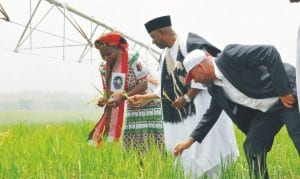Agriculture
Irrigation Is Necessary In N’Delta – Expert

L-R: Minister Of Water Resources, Mrs Sarah Ochekpe, Vice President Namadi Sambo and Managing Director, Salini Construction Company, Dr Piero Capitanio, inspecting rice farm, during the inauguration of Gurara Irrigation Project at Kachia Local Government Area of Kaduna State, recently.
Following the notion that
irrigation is the exclusive preserve of the Northern part of Nigeria, an agricultural engineer, Mr. Umor Adaotu, has debunked such claims.
Adaotu who spoke to our correspondent in a telephone interview yesterday said such notion was borne out of the belief that the southern zone of the country had enough moisture due to proximity and Niger Delta terrain.
“People assume that they have enough moisture, it is not that it cannot be practiced, so even with enough moisture you have to programme things in accordance with the weather,” he said.
On the dependence of farmers solely on the friendliness or otherwise of weather by conditions by farmers in the south for expected crop yield, Adaotu said it was based on this that many farmers in the Niger Delta Delta region resort to manual watering of their crops during dry season.
He explained that large scale irrigation could be practiced in the southern part of the country and any other part that was not known for the process.
According to him, an example is the Niger Delta Basin Development Authority farm at Kpor in Ogoni where irrigation was done some years ago.
He further explained that as a student on Industrial Training (IT) at the farms, he noticed that the process proved to be successful.
Adaotu who is a graduate of the Rivers State University of Science and Technology (RSUST) Port Harcourt said with irrigation the four months of dry season experienced in the Southern part of the country would no longer be the “farmers nightmare.”
“It is just a matter of getting access to the source of water and then channel same to the farms,” he said.
He further explained that waiting on the elements by famrers was counter productive even as he said structural irrigation whereby water was stored overhead to water crops could also be done to complement other methods.
He said during the dry season, production becomes low and that is when all season farming plays a crucial role.
“Even if the dry season lasts from three to four months, with irrigation you can still tend your corps to healthy maturity,” he said.
Adaotu who is of the Federal University of Agriculture, Abeokuta, Ogun State further called on the Federal Government, especially the incoming one to focus attention on the need to irrigate the Southern part of the country in order to further boost its agricultural potential.
Agriculture
FG, Ogun Distribute Inputs To 2,400 Farmers
Federal Government and the Ogun State Government, on Wednesday, distributed farm inputs to farmers as part of effort to address food security challenge.
The State Director, Federal Ministry of Agriculture and Food Security, Dr. Toyin Ayo-Ajayi, during the flag-off ceremony of Inputs Redemption Under The National Agricultural Growth Scheme-Agro Pocket (NAGS-AP), in Ogun State, disclosed that beneficiaries of the gesture were primarily rice, maize and cassava farmers across the State.
Ayo-Ajayi commended the Ogun State Government for partnering with the government at the centre for the effort in supporting farmers with inputs that would bring about yieldings for local consumption and likely exportation.
She noted that government is supporting rice, cassava and maize farmers with inputs worth N212,000; N189,000 and N186,000 respectively.
The Permanent Secretary in the State Ministry of Agriculture, Mrs Kehinde Jokotoye, who represented the Commissioner in the Ministry, Bolu Owotomo, stated that traditional farmers are critical in food production, hence the need to encourage and support them with inputs that would bring about desired results during harvesting.
Owotomo said: “Let us make good use of this opportunity, so that the success of this phase will make farmers benefit more from the state and federal governments of Nigeria.”
Earlier, State Coordinator, Federal Ministry of Agriculture and Food Security, Dr. Oluwatoyin Ayo-Ajayi, appreciated the present administration for partnering with the federal government for the initiative, adding that the programme is designed to support farmers at the grassroots level in cassava, rice and maize with inputs such as, seeds, pesticides, herbicides and fertilizers, to boost their production and enhance their livelihood.
Agriculture
Niger Allocates 10,000 Hectares For Smallholder Farmers
The Niger State Government has mapped out 10,000 hectares of farmland in Gbapo Community of Katcha Local Government Area of the State for smallholder farmers to benefit from the state government’s agricultural intervention programme.
Two thousand out of the 10,000 holders of the farmlands have already received inputs.
At a flag-off ceremony in Yinti Village, the facilitator of the programme, Shinkafan Nupe, Malam Idris Usman Makanta, assured the farmers of increased distributions to the mapped-out ten thousand (10,000) farmlands if farmers respond positively.
He explained that the commencement of the two thousand is to measure the positive response of farmers before obtaining full-scale support.
Malam Makanta stated that this initiative aligns with the farmers’ initial commitment through Niger Foods, whose mission is primarily geared towards establishing efficient and profitable agricultural businesses to support the present administration of Governor Mohammed Umaru Bago’s quest to boost agricultural productivity in the state.
He also commended Niger Foods for their steadfastness and resilience in the effective implementation of the input financing scheme.
Makanta reiterated the commitment of the State Governor in making judicious use of the arable land in the state.
Shinkafan Nupe, therefore, urged the farmers to support the Governor by using the inputs wisely so that the dream can be actualised.
Agriculture
GO-CARES: Gombe Empowers 573,429 Farmers, Entrepreneurs
The Gombe State Government has empowered a total of 573,429 farmers and entrepreneurs under the 4th phase of the GO-CARES programme.
The programme was officially flagged off by Governor Inuwa Yahaya in another major step towards alleviating poverty and supporting the state’s vulnerable populations.
The Governor, while inaugurating the disbursement in Akko Community of Akko Local Government Area, restated his administration’s commitment to the welfare of vulnerable citizens in the state.
He was represented by the Commissioner for Budget and Economic Planning, Salihu Baba Alkali, who is also the Chairman of the Steering Committee on GO- CARES implementation.
“The 4th phase of GO-CARES will directly and indirectly impact a total of 573,429 citizens across the state. Of these, 152,429 individuals will benefit directly through cash transfers, livelihood grants, agricultural inputs, and operational grants to small businesses”, he stated.
The Governor added that, “421,000 people will be indirect beneficiaries through infrastructural projects such as classroom blocks, healthcare facilities, WASH services, and rural infrastructure projects like culverts and drainages”.
Yahaya, reaffirmed his commitment to ensuring that the state’s most vulnerable citizens are not left behind in the state’s development.
According to him, “Earlier this year, on June 25, 2024, we flagged off the distribution of improved seedlings, fertilizers, and herbicides to less privileged farmers in Malam Sidi, Kwami Local Government Area, signaling the commencement of the 4th phase implementation of GO-CARES under Result Area 2”.
The Governor reiterated that these initiatives have had a significant impact on the livelihoods of beneficiaries and the overall agricultural sector.
He explained that, “Today’s ceremony marked the simultaneous launch of activities under all three GO-CARES Result Areas for the 4th phase. These areas include: State Cash Transfer Grants: 2,500 direct beneficiaries; Labour Intensive Public Works: 2,700 direct beneficiaries; Livelihood Grants: 10,000 direct beneficiaries; and Basic Services: 405,000 indirect beneficiaries”.
-

 Featured5 days ago
Featured5 days agoCBN Retains N100 ATM Fee For Withdrawal Below N20,000
-
Politics5 days ago
Rivers Assembly Tasks LGAs On Youth Restiveness …Confirms Assembly, LG Service Commissions
-
Nation5 days ago
I Was Never Suspended As LP Chairman-Dokubo
-

 News5 days ago
News5 days agoECOWAS Court Orders Nigeria to Pay N52m compensation to Rivers, Lagos Evictees
-
Entertainment5 days ago
Toyin Lawani Cries Out Over Side Effects Of Epidural
-
Sports25 mins ago
‘Don’t Rely Too Much On NCAA Athletes’
-
News5 days ago
Odu Consoles Justice Okirie On Mother’s Demise
-
Politics5 days ago
No Delta Assembly PDP Lawmaker Defecting To APC – Majority Leader

